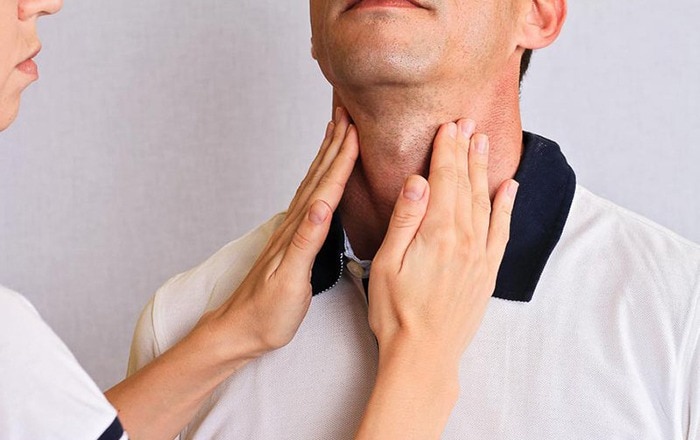Medical news August 23: Changing mentality to go to the doctor to detect hyperthyroidism
For the past two months, Ms. P. has been irritable and anxious, and was thought to have a mental illness. When she had a medical examination, she was diagnosed with hyperthyroidism. The rapid change in thyroid hormone levels caused emotional turmoil.
Watch out for signs of hyperthyroidism
From a person who always smiled and talked happily, woke up early every morning to exercise, spent 3 sessions a week climbing mountains, but for the past 2 months, Ms. THP (38 years old, Dong Nai) had to give up this hobby, just climbing 4-5 stairs made her out of breath. Many times, even when doing nothing, her heart still beat fast.
 |
| Illustration photo. |
She had light sleep, was lethargic, woke up feeling lethargic, tired, had no appetite, and lost 1kg. In particular, she was always uncomfortable, frustrated, and restless. Ms. P. said she was easily irritated by many small things that she had previously thought were normal, whether at home or at work.
Ms. P. felt she could not control her emotions, sometimes she spoke harshly to her relatives, when she calmed down she felt regretful and tormented. Many times she wanted to cry to put out the "fire" inside her, she did not understand why her life had changed so much.
Ms. P. thought she had a “mental illness” due to her busy work schedule, so she sought out a psychologist. However, the doctor suspected that she had thyroid disease, so she needed to go to Tam Anh General Hospital in Ho Chi Minh City for intensive treatment.
According to Dr. Vo Dinh Bao Van, Department of Endocrinology and Diabetes, Tam Anh General Hospital, Ho Chi Minh City, blood test results showed that Ms. P. had hyperthyroidism - high thyroid hormone, specifically FT4 hormone was 40.24pmol/l, 2 times higher than normal, thyroid stimulating hormone TSH decreased to
Dr. Van explains that thyroid hormones play an important role in metabolism. Increased thyroid hormones affect many functions such as body temperature, cardiovascular system, nervous system, mental system, and musculoskeletal system.
Rapid changes in thyroid hormone levels can disrupt the patient's emotions. They may have symptoms such as: restlessness, mood swings, irritability, emotional outbursts, anger. If not treated early, it can lead to depression and mental disorders (less common).
In addition, the patient's liver enzymes are 7 times higher, requiring hospitalization. According to Dr. Van, hyperthyroidism can cause many dangerous complications, including high liver enzymes. Increased thyroid hormone levels lead to protein and lipid metabolism disorders, increased liver enzymes, and can recover when the hyperthyroidism is stable.
Ms. P. was treated with antithyroid drugs, thyroid hormone synthesis inhibitors, and high liver enzymes by an experienced specialist. After 1 week of treatment, liver enzymes were almost at a stable level, thyroid hormones were controlled, Ms. P. had a better appetite, was less tired, no longer had palpitations, and was in a happier mood. In addition, the patient was able to discuss, share, and receive counseling to stabilize her psychology again.
If hyperthyroidism is not treated promptly, it can cause other dangerous complications such as: atrial fibrillation, heart failure, double vision, loss of vision (blindness) due to eye disease (bulging eyes) or even thyroid storm - a life-threatening emergency.
Doctor Van said people can recognize hyperthyroidism through the following symptoms: Always feeling hot, sweating a lot, possibly having a mild fever of 37.5°C – 38°C. Warm, moist palms.
About 50% of hyperthyroidism cases have diarrhea without colic 5-10 times/day due to increased intestinal motility and decreased secretion of digestive tract glands.
Palpitations, rapid heartbeat. Possible headaches, dizziness, sleep disturbances, fatigue, decreased ability to work. Muscle fatigue, muscle weakness, myasthenia or paralysis.
If there are symptoms of hyperthyroidism, the patient should see a doctor in the Department of Endocrinology - Diabetes for early examination and treatment to prevent dangerous health complications.
Monkeypox is still under good control.
According to the Ho Chi Minh City Center for Disease Control, the locality is currently the locality with the highest number of cases (156 cases) and deaths (6 cases) in the Southern region in 2023 - 2024. In 2024 alone, the City had 49 cases of monkeypox, with no deaths.
A representative of the HCMC CDC said that the epidemiological characteristics of monkeypox cases in HCMC are that 100% are male with an average age of 32 (the youngest is 18 years old and the oldest is 53 years old).
The highest recorded age group was 30-39 years old (46%), 84% of cases identified themselves as men who have sex with men (MSM). Notably, 55% were living with HIV and 7% were on HIV pre-exposure prophylaxis.
The city has not recorded any changes in the epidemiology of the disease. The virus strain causing the disease is still clade IIb - the strain causing the epidemic in countries around the world, clade Ib (a new strain of Mpox) has not been detected. The disease is still mainly transmitted among homosexual or bisexual men, through unsafe sexual behavior.
Regarding disease prevention procedures, the City Health Department continues to maintain disease prevention activities, conduct gene sequencing of some specimens to monitor the mutation of the disease-causing virus; at the same time, strengthen surveillance and detect suspected cases right at the border gate;
Actively monitor at medical examination and treatment facilities, pay attention to integrating monitoring and prevention with HIV/AIDS prevention and control activities, monitor at gynecological and dermatological examination and treatment facilities, public and private medical facilities providing HIV/AIDS prevention and control services.
In addition, organize training for medical staff at all levels on monitoring, measures to prevent, control, care, treatment, and prevent infection; review and update plans and scenarios for prevention and control according to situations to be ready to respond when an epidemic occurs in the area; prepare medicines, equipment, human resources, and funding to implement measures to admit, treat, prevent, and control the epidemic.
In addition, the health sector also strengthens information and communication on disease prevention and control measures according to the recommendations of the Ministry of Health, focusing on communication for high-risk groups. Strengthening the organization of inspection, supervision, and direction of disease prevention and control work in localities and promptly reporting suspected and infected cases to the Ministry of Health.
In addition, the Ho Chi Minh City Department of Health recommends that if people discover that they or someone around them has symptoms of suspected monkeypox, they should immediately go to medical facilities for consultation, diagnosis and proper treatment.
Patients need to strictly follow the instructions of medical staff in caring for themselves, minimizing complications as well as strictly implementing infection prevention measures. The best preventive measure is to practice safe sex.
The following are 6 measures to prevent monkeypox recommended by the Ministry of Health: Cover your mouth and nose when coughing or sneezing, preferably with a cloth or handkerchief or disposable tissue or your sleeve to reduce the spread of respiratory secretions; wash your hands with soap and clean water or an antiseptic solution immediately after coughing or sneezing. Do not spit indiscriminately in public places.
Wash your hands regularly with soap and clean water or hand sanitizer. People with symptoms of acute rash of unknown cause accompanied by one or more suspicious symptoms should proactively contact a medical facility for timely monitoring and consultation; at the same time, they should proactively self-isolate and avoid sexual intercourse.
Avoid close contact with sick people, avoid direct contact with wounds, body fluids, droplets and objects and utensils contaminated with pathogens.
In case there is someone at home/workplace who is infected or suspected of being infected, it is necessary to notify the medical facility for timely advice and treatment, do not self-treat.
People traveling to countries where monkeypox is endemic should avoid contact with suspected/infected people, mammals (dead or alive) such as rodents, marsupials, and primates that may contain the Mpox virus. When returning to Vietnam, they should proactively report to local health authorities for advice.
Ensure food safety; practice a healthy lifestyle, increase physical activity, improve health.
Beware of rabies
One month after being bitten by a dog, an 8-year-old boy in Son La had a fever, headache, nausea, insomnia, fear of water and wind. The patient was taken to the National Hospital for Tropical Diseases for emergency care on the evening of August 21 with a diagnosis of rabies.
According to the family, a month ago, the boy was bitten on the right cheek by a strange dog that passed by. After the dog bit him, it disappeared and could not be tracked. The family took the boy for a tetanus shot but not a rabies shot.
Two days ago, the child had a high fever (38.5 degrees) with headache, nausea, loss of appetite, fear of water and wind. The family took the child to Son La General Hospital for treatment, then transferred him to the Emergency Department, Central Hospital for Tropical Diseases.
After more than 2 hours of hospitalization, the patient's family asked to take their child home for care.
Dr. Tran Quang Dai, Vaccination Consulting Department, Central Hospital for Tropical Diseases, said that rabies can also be transmitted from person to person through bites or contact with secretions of rabid patients. Once rabies has occurred, both animals and humans will die.
Doctor Dai recommends that when bitten by a dog, people should go to a medical facility for first aid, cleaning and disinfecting the wound and getting advice on rabies vaccination. In particular, getting vaccinated against rabies as soon as possible is recommended.
According to the representative of the Department of Preventive Medicine, the Ministry of Health said the risk of rabies transmission from animals to humans continues due to the low rate of rabies vaccination in the total dog and cat population; limited management of dog and cat populations; and limited public awareness.
Rabies is an extremely dangerous disease when it breaks out, people who have rabies are almost 100% fatal; the only way to save people when bitten by a rabid dog or cat is to get a rabies vaccine as soon as possible.
There is currently no specific treatment for rabies, but it is completely preventable. To proactively prevent rabies, people need to take the following measures: People who raise dogs and cats need to be fully vaccinated against rabies and get annual booster shots according to veterinary recommendations; dogs must be chained, locked up, and muzzled when going out.
Do not play with or tease dogs or cats. When bitten by a dog or cat, wash the wound immediately under running water with soap for 15 minutes; if soap is not available, rinse the wound with plain water. Afterwards, the wound should be cleaned with 70% alcohol or iodine alcohol; avoid bruising the wound and do not cover the wound.
Go to a medical facility promptly for examination, consultation and injection of rabies vaccine and anti-rabies serum; absolutely do not self-treat or seek treatment from a traditional healer.
Communicate and instruct children on how to prevent dog and cat bites and to immediately notify their parents or relatives after being bitten by a dog or cat.
Rabies can be prevented with a vaccine. The rabies vaccine does not harm the person who receives the vaccine. The rabies vaccine is made from inactivated rabies virus, so it cannot cause disease, memory loss, or other neurological problems.
The Ministry of Health recommends that people do not hesitate or hesitate to get vaccinated against rabies when bitten by a dog or animal. Go immediately to the nearest medical facility for timely advice and treatment.


![[Photo] Looking back at the impressive moments of the Vietnamese rescue team in Myanmar](https://vstatic.vietnam.vn/vietnam/resource/IMAGE/2025/4/11/5623ca902a934e19b604c718265249d0)

![[Photo] "Beauties" participate in the parade rehearsal at Bien Hoa airport](https://vstatic.vietnam.vn/vietnam/resource/IMAGE/2025/4/11/155502af3384431e918de0e2e585d13a)


























![[Photo] Summary of parade practice in preparation for the April 30th celebration](https://vstatic.vietnam.vn/vietnam/resource/IMAGE/2025/4/11/78cfee0f2cc045b387ff1a4362b5950f)

























































Comment (0)